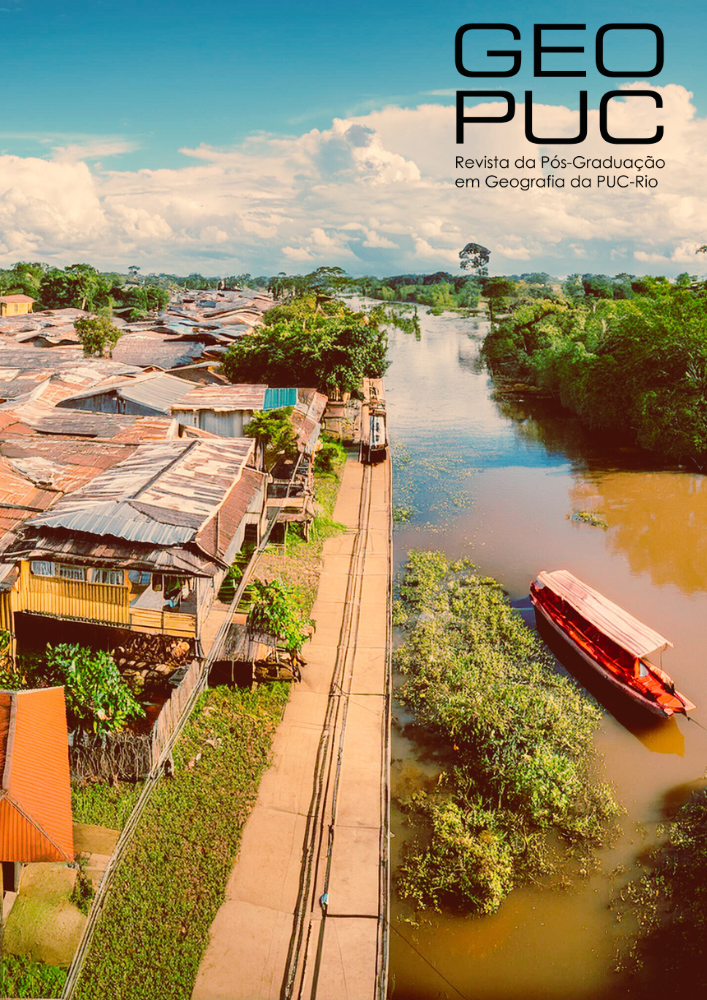Human Rights and Environmental Law: The Essential Interdependence for a Sustainable Future
DOI:
https://doi.org/10.64238/geopuc.2024.103Keywords:
Human rights, environmental justice, sustainability, climate change, environmental lawAbstract
Introduction: The article explores the interconnection between human rights and environmental law, highlighting the importance of a healthy environment for the realization of fundamental rights, such as the right to life, health, and dignity. It is based on an analysis of international and national regulations, such as the Universal Declaration of Human Rights and the 1988 Federal Constitution. Objective: To demonstrate that environmental protection is essential for ensuring human rights, showing how environmental degradation disproportionately affects vulnerable populations and emphasizing the need for an intersectoral approach to address environmental crises. Methods: The study analyzes the legal framework, including the 1972 Stockholm Conference, the International Covenant on Economic, Social, and Cultural Rights, and Brazilian environmental legislation, in order to examine the relationship between environmental justice and rights protection. Results: The article shows that indigenous and traditional populations are disproportionately affected by environmental degradation and climate change. In the Brazilian context, the Constitution and the National Environmental Policy provide a robust legal foundation, but their implementation still faces significant challenges. Conclusion: Environmental protection is crucial for the full guarantee of human rights, especially in addressing environmental crises that affect the quality of life of populations. An intersectoral approach is fundamental to ensuring a sustainable future.
Downloads
References
ACSELRAD, Henri. Justiça Ambiental e Cidadania . Rio de Janeiro: Fundação Getúlio Vargas, 2010.
ALMEIDA, Rita de Cássia. Desafios e Avanços da Justiça Ambiental em Minas Gerais. Revista Brasileira de Direito Ambiental, v. 17, n. 2, p. 113-130, 2020.
ANTUNES, Paulo de Bessa. Direito Ambiental . 22. ed. São Paulo: Atlas, 2019.
BARDIN, Laurence. Análise de Conteúdo . Lisboa: Edições 70, 2011.
BRASIL. Constituição da República Federativa do Brasil. Brasília: Senado Federal, 1988.
BRASIL. Lei nº 6.938, de 31 de agosto de 1981. Dispõe sobre a Política Nacional de Meio Ambiente, seus fins e mecanismos de formulação e aplicação e dá outras providências. Disponível em: Lei nº 6.938/81. Acesso em: 24 out. 2024.
BOYLE, Alan. Human Rights and the Environment: Where Next? European Journal of International Law, v. 31, n. 3, p. 675–699, 2020. DOI: 10.1093/ejil/chaa056.
BRUGGER, Paula. Educação ambiental: uma proposta para a formação de professores. São Paulo: Cortez, 2011.
CARVALHO, Mariana. Política Ambiental e Direitos Humanos: Um Estudo de Caso em Minas Gerais. Cadernos de Pesquisa em Direito Ambiental, v. 12, n. 1, p. 45-67, 2021.
FREIRE, Paulo. Pedagogia da autonomia: saberes necessários à prática educativa . 45. ed. São Paulo: Paz e Terra, 1996.
FREITAS, Silvana. Impactos da Degradação Ambiental sobre Comunidades Vulneráveis em Minas Gerais. Revista Brasileira de Estudos Sociais, v. 18, n. 1, p. 75-89, 2022.
GIL, Antonio Carlos. Métodos e Técnicas de Pesquisa Social . 7. ed. São Paulo: Atlas, 2019.
GOMES, Wilmar. Direito Ambiental e a Proteção dos Direitos Humanos no Brasil. Revista de Direito Ambiental, v. 23, n. 4, p. 65-80, 2019.
IPCC. Sexto Relatório de Avaliação . 2021. Disponível em: https ://www .ipcc .ch /report /ar6 /syr/ . Acesso em: 16 out. 2024.
KNIGHT, Geoffrey. Human Rights and the Environment: Key Challenges. Journal of Human Rights and the Environment, v. 9, n. 2, p. 112–133, 2018. DOI: 10.4337/jhre.2018.02.01.
MINAYO, Maria de Sousa. Pesquisa Social: Teoria, Método e Criatividade . 30. ed. Petrópolis: Vozes, 2017.
OLIVEIRA, Rafael. Metodologia da Pesquisa Científica . 2. ed. São Paulo: Atlas, 2019.
ONU. Declaração de Estocolmo sobre o Meio Ambiente Humano . 1972. Disponível em: https ://www .un .org /ga /search /view_doc .asp ?symbol =A /CONF .48 /14 /REV .1 . Acesso em: 16 out. 2024.
ONU. 64/292 – O direito humano à água e à resolução ao saneamento . 2010. Disponível em: https ://www .un .org /waterforlifedecade /human_right_to_water .shtml . Acesso em: 16 out. 2024.
ONU. Acordo de Paris . 2015. Disponível em: https ://unfccc .int /sites /default /files /english_paris_agreement .pdf . Acesso em: 16 out. 2024.
PEREIRA, Luís. O Papel das Comunidades na Proteção Ambiental e nos Direitos Humanos. Revista de Estudos Ambientais, v. 10, n. 2, p. 30-44, 2023.
SANDS, Philippe. Environmental Protection in the 21st Century: Sustainable Development and International Law. International Environmental Agreements, v. 12, n. 2, p. 205–226, 2012. DOI: 10.1007/s10784-011-9154-4.
SANTOS, Milton. A Natureza do Espaço: Técnica e Tempo, Razão e Emoção . São Paulo: Hucitec, 2018.
SEVERINO, Antonio Joaquim. Metodologia do Trabalho Científico . 24. ed. São Paulo: Cortez, 2016.
SOARES, Lúcia M. Gender and Environmental Justice: Intersections and Policy Implications. Journal of Environmental Policy and Planning, v. 23, n. 4, p. 456–475, 2021. DOI: 10.1080/1523908X.2021.1876213.
SOUZA, Marcelo. Ambiente e Sociedade . São Paulo: Contexto, 2016.
VIOLA, Eduardo. Climate Governance in an International System under Crisis. Global Environmental Politics, v. 16, n. 2, p. 1–20, 2016. DOI: 10.1162/GLEP_a_00357
Downloads
Published
How to Cite
Issue
Section
License
Copyright (c) 2024 Eduardo da Cunha Miguel

This work is licensed under a Creative Commons Attribution-NonCommercial-ShareAlike 4.0 International License.
Os Direitos Autorais dos artigos publicados na revista GeoPUC pertencem aos seus respectivos autores, com os direitos de primeira publicação cedidos à Revista. Toda vez que um artigo for citado, replicado em repositórios institucionais e/ou páginas pessoais ou profissionais, deve-se apresentar um link para o artigo disponível no site da GeoPUC.
Os trabalhos publicados estão simultaneamente licenciados com uma Licença Creative Commons BY-NC-SA 4.0.


